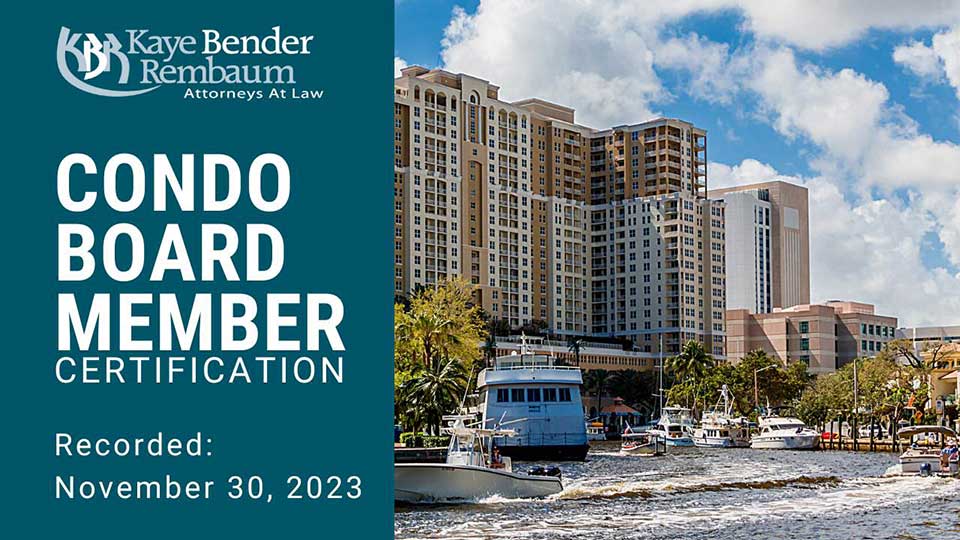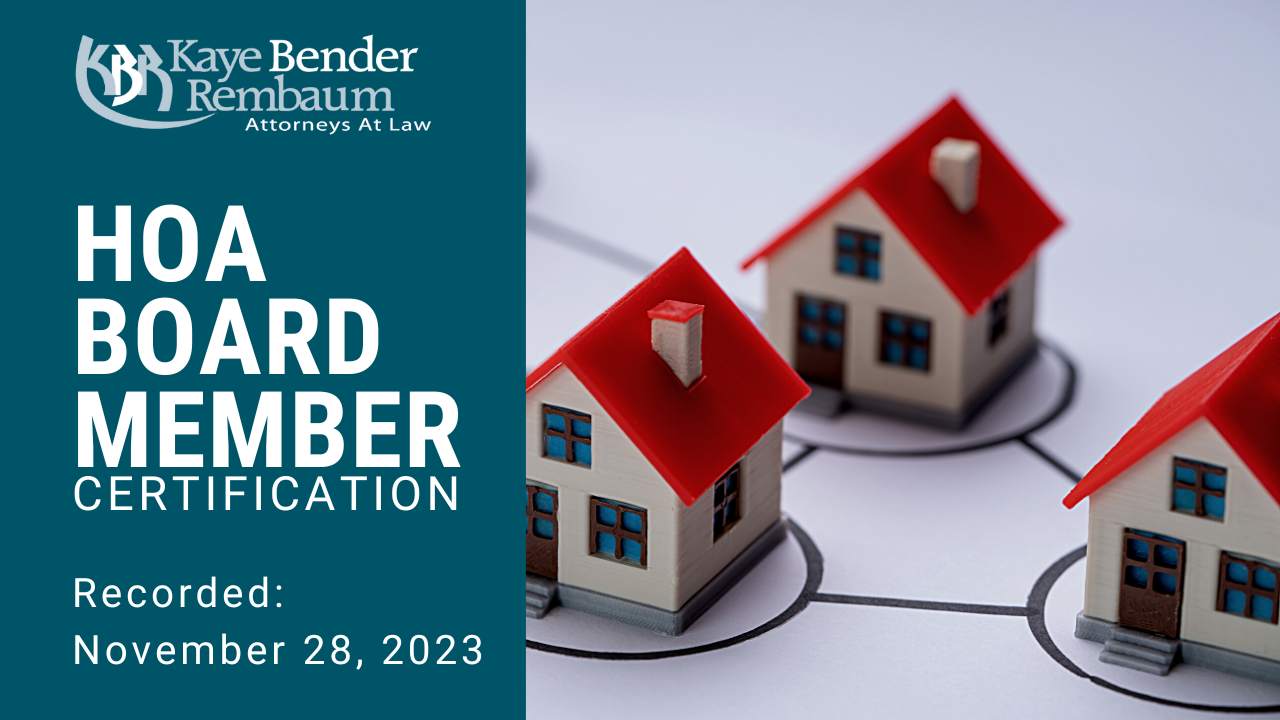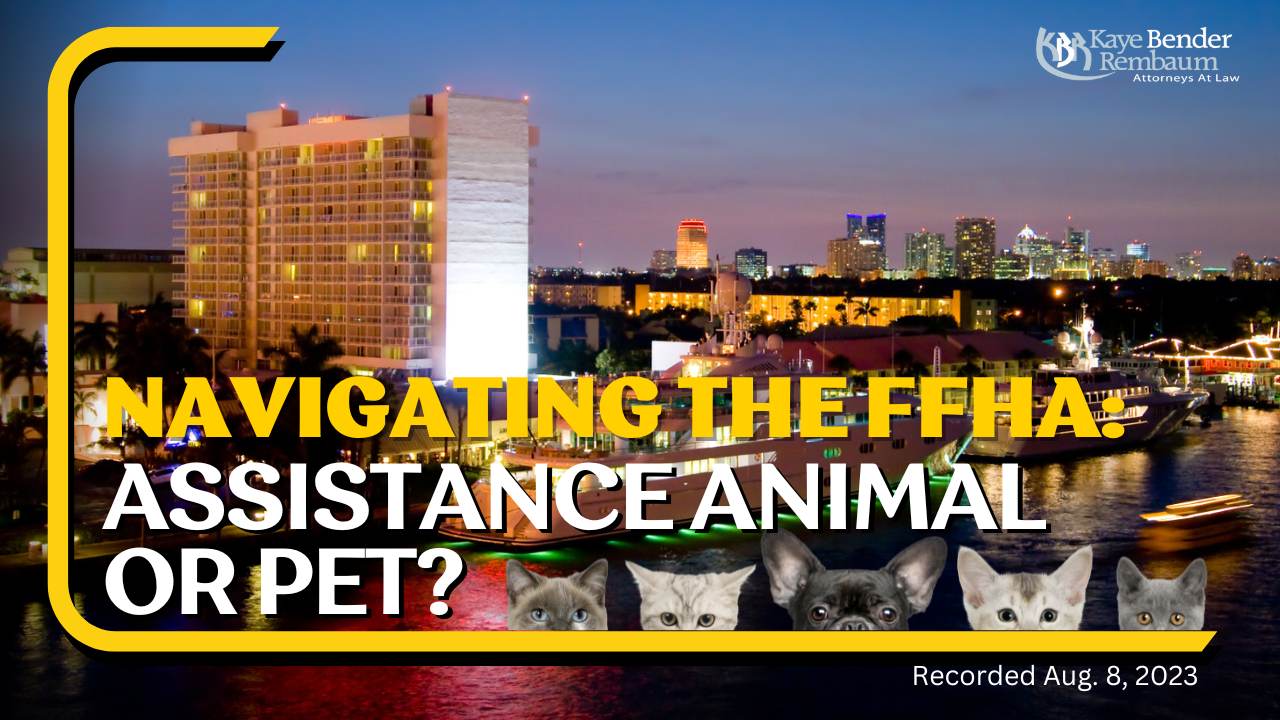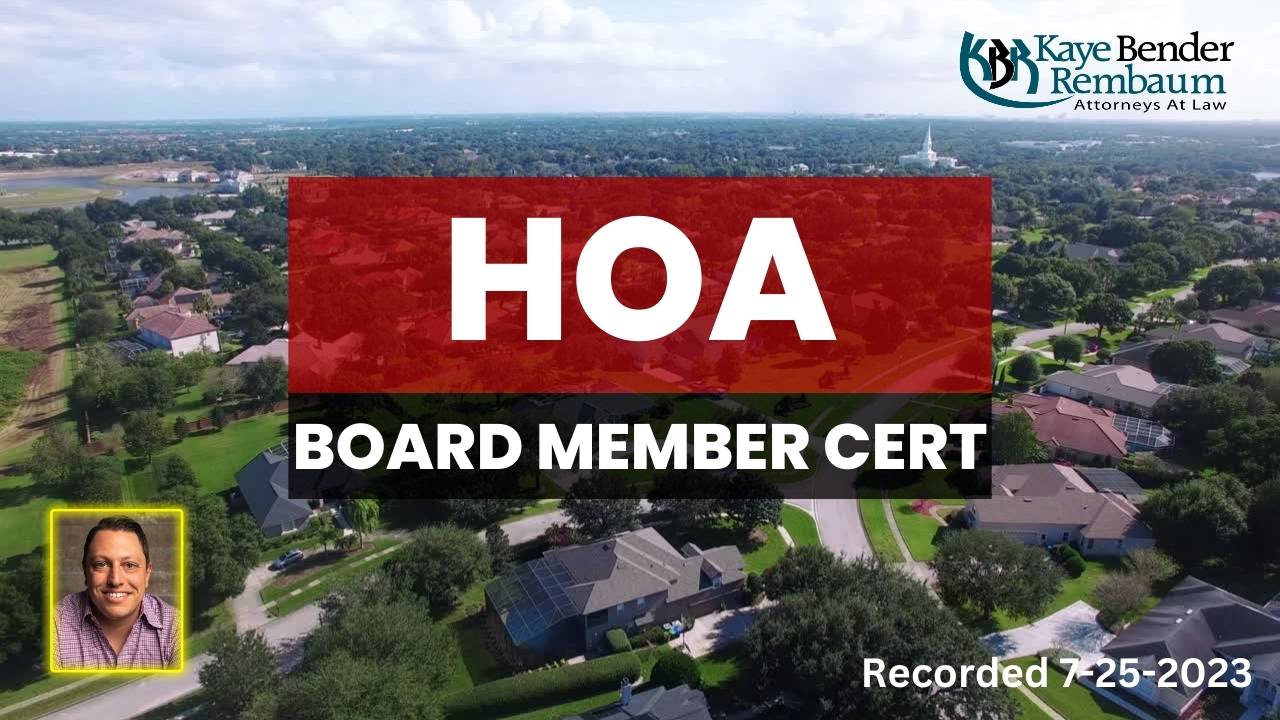HOA Board Member Certification | Recorded November 28, 2023
Navigating FFHA: Assistance Animal or Pet? | August 8, 2023
HOA Board Member Certification | Recorded July 25, 2023
Guest Restrictions and Screening Tenants and New Owners | July 18, 2023
REMBAUM’S ASSOCIATION ROUNDUP: YOU GET WHAT YOU PAY FOR – ASSISTANCE ANIMAL APPLICATION PACKAGES
FIRST DISTRICT COURT OF APPEAL CLARIFIES UNIT OWNER OBLIGATIONS ON PAST DUE ASSESSMENTS AND IDENTIFIES CONFLICT WITH THIRD DISTRICT CASE
In 2013, the world of Florida condominiums was thrown by what many considered to be the controversial decision of Aventura Management, LLC v. Spiaggia Ocean Condominium Association, Inc., which, in effect, limited the obligation of an owner for unpaid assessments of prior owners. (See prior Legal Morsel articles discussing the Spiaggia cases here; and, for the follow-up case, here).
The main issue in Spiaggia addressed the limit of how far back into prior owners’ unpaid assessments a current owner will be held accountable. Section 718.116 of Florida Statutes provides that an owner is jointly and severally liable for sums due from the prior owner. Spiaggia limited that to one prior owner and for only sums unpaid during that ownership. Florida practitioners in this area of the law, including Kaye Bender Rembaum, overwhelmingly agree that the Spiaggia decision was not correct. The Florida Legislature also apparently thought so and amended Section 718.116 F. S. the following year in an effort to correct the misconception. On July 16, 2019, the Florida First District Court of Appeal issued its decision in Coastal Creek Condominium Association, Inc., v. Fla. Trust Services LLC, Case No. 1D18-1457, which expressly conflicts with the conclusions of Spiaggia as to what is owed by a current owner.
Coastal Creek Condominium Association, Inc. filed a foreclosure action to collect on unpaid maintenance assessments. The Appellate Court discusses the history of the ownership of the unit and indicates that Fla Trust Services, the defendant/current unit owner in this foreclosure, had taken title to the unit on July 26, 2016, from Homes HQ, which had purchased the property at a mortgage foreclosure sale, with title conveyed to it on June 13, 2016. The original owners in all of this, who were foreclosed upon by the lender in 2016, were Tracy Langley and Todd Levraea (called “Original Owners” by the Court). The foreclosure by Coastal Creek sought sums due from August 15, 2015, which pre-dated Homes HQ ownership and the mortgage foreclosure, when the unit was owned by the Original Owners. The lower court decided that Fla Trust owed assessments only from Home HQ’s ownership and not from the time of the Original Owners, relying upon the holding of Spiaggia. The Appellate Court disagreed with that conclusion, deciding that sums claimed by the Association from the Original Owner were owed by Fla Trust as well.
In reaching its decision, the Appellate Court reviewed the relevant portion of Section 718.116 F.S., and concluded that Spiaggia had not fully grasped the intent of the Statute, which was that a current owner is jointly and severally liable for all unpaid assessments from all prior owners, not just from the time the unit was owned by the immediately prior owner, as the Spiaggia court concluded. Home HQ was jointly and severally liable for all of the sums due from the owner prior to it, the Original Owners. As such, Fla Trust was likewise liable for these sums. As a result, the Court concluded that Fla Trust is required to pay for the assessments that were not paid by Home HQ and the Original Owners. (Fla Trust still has the ability to bring legal claims against Home HQ and/or the Original Owners for their portion of the unpaid assessments.)
As a result of this conflict between District Courts of Appeal, the First District Court has certified the conflict to the Florida Supreme Court to consider whether to resolve it. We will be monitoring the progress of that certification and report any news as it develops. However, until such time as the conflict is resolved, the effect of this conflicting decision in the First District Court of Appeal from the prior decision in the Third District depends upon where the property is located that is the subject of a condominium foreclosure. For property within the jurisdiction of the 3rd DCA (Miami-Dade and Monroe Counties), the Spiaggia decision remains the law that should be followed, and for properties located within the 1st DCA (the most northern and northwestern part of Florida, including Tallahassee and surrounding areas), the Coastal Creek decision is to be followed. For all other jurisdictions in Florida, lower level judges will choose between the two in reaching their decisions. This can result in inconsistent rulings on the same issue, even in the same courthouse, until the Supreme Court resolves the conflict.
Additionally, and equally important here, from the way this Appellate Court phrased its opinion, it may have clarified that the 2015 holding of the Fourth District Court of Appeal in Pudlit 2 Joint Venture, LLP v. Westwood Gardens Homeowners Association, Inc., only applies to homeowners associations and not to condominiums. (See Legal Morsel on the Pudlit decision published by Kaye Bender Rembaum, P.L. here.) The Pudlit decision limited the obligation of certain third party purchasers at a lender foreclosure sale in a homeowner association based upon provisions contained in the documents of that community rather than what is set forth in the Statute. Since Pudlit was published, there have been inconsistent rulings in the lower courts regarding whether or not that same limitation applies to condominiums. In Coast Creek, the Appellate Court expressly includes sums which came due prior to the lender foreclosure. Since the unit was purchased by a third party at the lender foreclosure sale, the Court holding here did not provide the third party an exemption from the obligation to pay for sums due prior to foreclosure, as many have argued in recent years. This may prove to be very helpful to condominium associations in Florida in the future.






